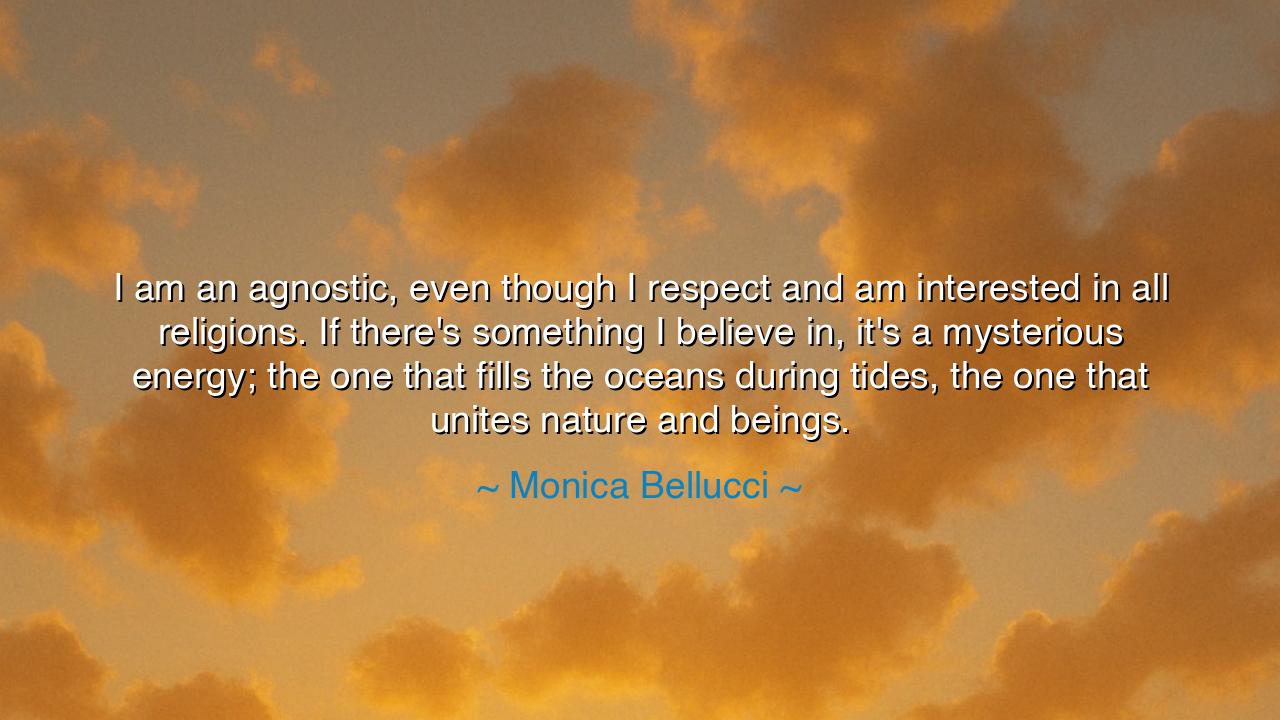
I am an agnostic, even though I respect and am interested in all
I am an agnostic, even though I respect and am interested in all religions. If there's something I believe in, it's a mysterious energy; the one that fills the oceans during tides, the one that unites nature and beings.






In the profound words of Monica Bellucci, “I am an agnostic, even though I respect and am interested in all religions. If there's something I believe in, it's a mysterious energy; the one that fills the oceans during tides, the one that unites nature and beings,” we hear an evocative reflection on the mystery of existence and the deep spirituality that transcends religious boundaries. Bellucci, an agnostic, does not dismiss the richness of religion but instead embraces the notion that there exists a unifying force—an energy—that connects all things in the natural world. This is not the energy of any one belief, but rather a mysterious force that pulses through the earth, the oceans, and all living beings, binding them together in a harmonious rhythm. Her words suggest that spirituality is not confined to doctrinal boundaries but is instead an experience of connection that permeates the very fabric of the universe.
The origin of this quote reflects Bellucci’s own personal exploration of spirituality. While she acknowledges that she does not adhere to any particular religious doctrine, she respects the beliefs of others and recognizes the mystical energy that exists within and beyond human understanding. Bellucci’s view is one that embraces the idea that the search for truth does not necessarily lie within the confines of organized religion, but can be found in the natural world, in the cycles of the oceans, and in the interconnectedness of all beings. This is a recognition of the mystery of life, one that defies explanation but is nonetheless felt in the deepest parts of the soul.
In the ancient world, the question of a unifying force was central to the philosophies of many great thinkers. Heraclitus, the Greek philosopher, famously spoke of the Logos, an underlying principle that governs the universe, a force that flows through everything and connects all things. His concept of the Logos echoes Bellucci’s idea of a mysterious energy that unites all of nature. Heraclitus believed that all things were in a state of constant flux, and yet they were bound together by a deeper, unseen force. This force, much like the energy Bellucci describes, is not immediately visible but can be perceived in the movements of nature and the rhythms of life. It is through the tides, the seasons, and the cycles of nature that we can sense this mysterious energy—the same energy that flows through human beings, uniting them with the earth, the oceans, and the stars.
Consider the ancient practice of shamanism, where spiritual leaders in tribal cultures sought to understand and connect with the natural world. Shamans believed that everything in nature—animals, plants, the wind, and the earth itself—was imbued with spiritual energy. They performed rituals to align themselves with the universal forces of nature, tapping into a wisdom that transcended human understanding. Their connection to the world around them was not limited to what could be seen or measured but was a deep spiritual union with the forces of life. This aligns with Bellucci’s view: that the energy connecting all beings is not something that can be fully understood or quantified but is instead a mystical force that can be felt in the heart and soul.
The lesson from Bellucci’s words is one of openness and humility. In her reflection, she teaches us that respect for all belief systems is essential for understanding the vastness of human spirituality. While agnosticism offers a stance of uncertainty, it does not dismiss the possibility of a deeper, unifying energy that connects all things. Bellucci’s view suggests that true spirituality is not about adherence to one particular set of beliefs but about an openness to the mysterious and an acknowledgment that the force that binds the universe is beyond the grasp of human understanding. Her words invite us to embrace the mystery—to accept that we may never fully comprehend the forces that shape our lives, yet still feel their presence.
Throughout history, many have sought to find meaning in this mystery of existence, from the Sufis of the East to the mystics of the West. The great mystic poets like Rumi wrote of the divine presence they felt flowing through the natural world, and St. John of the Cross spoke of the experience of union with the divine as a mystery that transcended all human understanding. These spiritual leaders shared in the sense of the mysterious energy that Bellucci refers to, one that connects humanity to the divine and to each other. They understood that faith and belief could not be limited to doctrine alone, but must be experienced in the connection with the greater forces of nature and the universe.
The practical action we must take from Bellucci’s reflection is to cultivate a deep respect for the mysterious energy that binds us to the world around us. While we may not fully understand the forces at work in our lives, we must learn to honor them. Whether through meditation, contemplation, or simply walking in nature, we must open ourselves to the rhythms of the earth, to the tides and the seasons, and to the energy that connects us to all living things. In doing so, we deepen our connection to the world, and through that connection, to the deeper mysteries of life. Let us, then, like Bellucci, recognize that the search for truth is not always about the certainty of answers, but about living in harmony with the unseen, mysterious energies that flow through us all.






AAdministratorAdministrator
Welcome, honored guests. Please leave a comment, we will respond soon